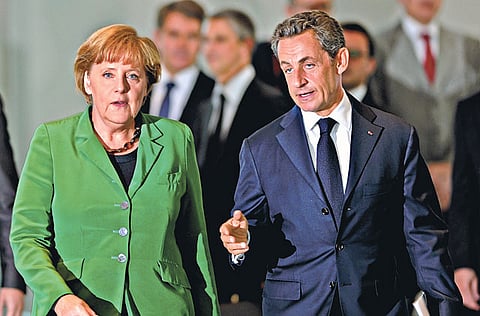Eurozone faces fresh recession
EU warns the 17-country Eurozone could slip back into recession next year

Brussels: The European Union has warned that the 17-country Eurozone could slip back into recession next year as the debt crisis shows alarming signs of spinning out of control.
The EU's economic watchdog, the European Commission, said on Wednesday its central forecast is that the Eurozone will grow by only a paltry 0.5 per cent in 2012. That's way down on the 1.8 per cent prediction it made in the spring.
EU unemployment will be stuck at 9.5 per cent for the foreseeable future, the Commission warned.
"While jobs are increasing in some member states, no real improvement is forecast in the unemployment situation in the EU as a whole," Rehn said.
The report also contained some worrying figures for some individual member states. Italy is unlikely to fulfil its promise of balancing its budget by 2013 if recently promised austerity and reform measures aren't implemented.
According to the forecast, which does not take into account the most recent promises, Italy will still run a deficit of 1.2 per cent, with debt close to 119 per cent of economic output. And growth is set to slow to 0.1 per cent next year, down from 1.3 per cent forecast this spring.
Rehn added that because of the relatively long average maturities of Italy's debt, the country could sustain the recent jump in borrowing costs for a short time. Several other states that have so far not been caught up in the debt storm will soon risk sanctions under new EU spending rules if they don't implement additional measures to get their budgets under control, Rehn warned.
"What we need now is unwavering implementation," Rehn said. "On my part, I will start using the new rules of economic governance from day one."
The countries that may face sanctions first are the Eurozone nations of Belgium, Cyprus and Malta, as well as Hungary and Poland, which do not use the euro.
Forecast
Under the new rules, set to come into force in mid-December, sanctions for countries that break the caps on budget deficits and debt levels become more automatic, in an effort to prevent a worsening of the debt crisis.
Rehn warned that spiralling lending rates "would have a significant impact on financing conditions and thus also growth of the real economy."
In Rome, a former EU official who made his name in anti-trust tussles with US corporate giants appeared front-runner to lead a national unity government. Mario Monti's appointment was not a done deal however after several leading members of Silvio Berlusconi's centre-right coalition insisted on early elections.
German Chancellor Angela Merkel said Italy's political situation needed to be "clarified as quickly as possible", echoing an earlier call by Christine Lagarde, the new head of the International Monetary Fund.
The extent of the crisis in Italy was highlighted on Wednesday when its 10-year bond yields flew over 7.0-per cent to heights that could make it impossible for Rome to keep financing its debt.
In a key test after Berlusconi's resignation announcement, Italy yesterday paid record rates of over six per cent at an auction of 12-month treasury bills. Greece at least finally appointed a new prime minister, ending four days of talks brokered by President Carolos Papoulias.



